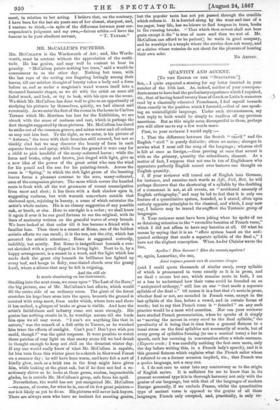MR. McCALLUM'S PICTURES.
11.8. MCCALLUM is the Wordsworth of Art ; and, like Words- worth, must be content without the appreciation of the multi- tude. He has genius, and may well be content to bear its penalty. "McCallum paints nothing but trees," said a would-be connoisseur to us the other day. Nothing but trees, with the last rays of the setting sun lingering lovingly among their leaves, till our subtlest thought of beauty takes a body and a form before us, and as under a magician's wand weaves itself into a thousand fantastic shapes, as we sit with the artist on some old faded trunk, and look, or try to look, with his eyes on the scene. We think Mr. McCallum has done well to give us an opportunity of studying his pictures by themselves, quietly, we had almost said reverently. As we enter the first of the rooms in the house in Carlton Terrace which Mr. Morrison has lent for the Exhibition, we are struck with the sense of coolness and rest, which is perhaps the first thought suggested by these pictures. Mr. McCallum has dared to strike out of the common groove, and mixes water and oil colours as may suit him best. To the right, as we enter, is his picture of -" Autumn," the trees with their branches still covered, but not so thickly clad but we may discover the beauty of form in each separate branch and spray, while from the ground it were easy for a child to pick handsful of the many-coloured leaves ; while the ferns and brake, crisp and brown, just tinged with light, give us -a new idea of the power of the great artist who uses the wind for his pencil and the sun for his painting-brush. Across the room is " Spring," in which the rich light green of the bursting leaves forms a pleasant contrast to the sere, many-coloured, ones of the companion picture. The moss which covers the knarled roots is fresh with all the wet greenness of recent emancipation from snow and sleet ; it lies there with a dark shadow upon it, suggesting coolness, but with warmth somewhere outside that sheltered spot, rejoicing in beauty, a sense of which saturates the artist's whole nature. His is no clumsy suggestion of any possible oak, or beech, or elm. Here to our right is a cedar ; we shall know at again if ever it be our good fortune to see the original, with its lines of ancientry written on the graceful waves of every branch. We have looked at that cedar till it has become a friend with a familiar face. Then there is a sunset at Rome, one of the boldest artistic efforts we can recall ; it is the sun, not the city, which has arrested the artist's attention ; Rome is suggested correctly, indelibly, but mistily. But Rome is insignificant beneath a sun- -set sketched with a pencil dipped in living light. Next to it, by a happy arrangement, is a sunset in a wood, and the light which has made dark the great city beneath its brilliance has lighted up -every leaf, and hangs in flaky, rose-tinted clouds over the grassy knoll, where a silence that may be felt is reigning, And the still air Is music slumbering on her instrument.
Strolling into the next room, we come upon " The Last of the Race," the big picture, one of Mr. McCallum's last efforts, which would fill the entire side of an ordinary room. The giant of the forest stretches his huge bare arms into the space, beneath the ground is covered with crisp snow, from under which, where here and there it has melted, a glimpse of brake or grass is visible. And here the artist's faithfulness and industry come out most strongly. His genius has nothing erratic in it, he worships nature till she lends him eyes we all may covet. " I can't see anything like that in nature," was the remark of a dull critic to Turner, as he watched ohim trace the effects of sunlight. Can't you ? Don't you wish you -could, though ?" was the quiet response. It were possible to watch those patches of rosy light on that snowy scene till we had drunk in thought enough to keep out chill on the dreariest winter day. If any one would really know of what Mr. McCallum is capable, let him turn from this winter piece to a sketch in Sherwood Forest on a summer day ; he will have been warm, and have felt a sort of /kindly glow, such as a brisk run in the frost might have given him, while looking at the giant oak, but if he does not feel a re- actionary shiver as he looks at those green, sunless, impenetrable glades, he is outside Mr. McCallum's grasp, safe from his spell.
Nevertheless, the world has not yet recognized Mr. McCallum —we mean, of course, for what he is, one of its few great painters— nor is it likely as yet to do so. His pictures will never lack buyers. There are always men who have an instinct for scenting genius, but the popular taste has not yet passed through the crucible which refines it. It is hurried along by the wear and tear of a
too eager, busy life, has no leisure to find tongues iu trees, books in the running brooks. "That which thou sowest shall not bear grain except it die " is true of more seed than we wot of. Mr. McCallum can afford to be patient; he waits in good company, and he worships in a temple where the service does not weary, and at a shrine whose votaries do not shout for the pleasure of hearing
their own echo. No ARTIST.






























 Previous page
Previous page